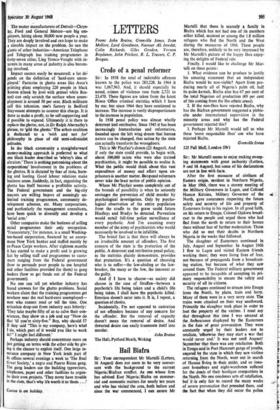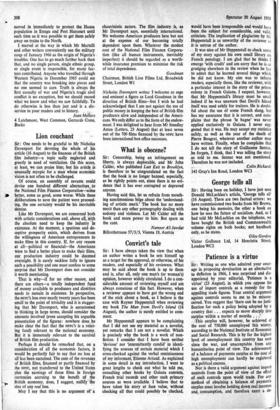Sir: Mr Martelli seems to enjoy making sweep- ing statements
with great authority (Letters, 9 and August), but some of his declarations are -not in line with facts.
After the first massacre of civilians of Eastern origin, assident in Northern Nigeria, in May 1966, there was a stormy meeting of the Military Governors in Lagos, and Colonel Hassan Katsina, Military Governor of the el North, gave -assurances respecting the future safety and security of life and property of Easterners living in his region. In all good faith, on his return to Enugu, Colonel Ojukwu brox.1- cast to the people and urged those who had fled from the north to return to their homes there without fear of further. olestation. Thrise who did so met their deaths in Northern Nigeria in the weeks that followed.
The slaughter of Easterners continued in July, August and September. In August 1966 I flew to Lagos and visited Eastern friends working there; they were living Eves of fear, not be.cause of propaganda from a broadcast- ing station, but because of what they saw around them. The Federal military government appeared to be incapable of accepting its pri- mary responsibility to ensure the safety and security of all its citizens.
The refugees continued to stream into Enugu from the North, by plane, train and lorry. Many of them were in a very sorry state. The trains were attacked on their way southward. Primarily the Ilaughter took place in order to loot the property of the victims. I must say that throughout this time I was amazed at the forbearance displayed by the Easterners in -the fax of great provocation. They were constantly urged by their leaders not to retaliate, 'otherwise they may start a war that would never end.' It was not until August/ September that there was any retaliation Both in Enugu and in Port Harcourt gangs of youths, augerea by the state in which they saw victims returning from the North, went out in search of Hausas wing in their midst, and so inno- cent houseboys and night-watchmen suffered for the deeds of their hooligan compatriots in the North. No one condones acts of retaliation, but it is only fair to record the many weeks of severe provocation that preceded them, and the fact that when they did occur the police
moved in immediately to protect the Hausa population in Enugu and Port Harcourt until such time as it was possible to get them safely away on trains to the North.
I marvel at the way in which Mr Martelli and other writers conveniently use the military coup of January 1966 as the origin of Nigeria's troubles. One has to go much farther back than that, and no single person, single ethnic group, or single event is responsible, for many fac- tors contributed. Anyone who travelled through Western Nigeria in December 1965 could see that the country was breaking into pieces and no one seemed to care. Truth is always the first casualty of war and Nigeria's tragic civil conflict is no exception, but we should record what we know and what we saw faithfully. To do otherwise is less than just and is a dis- service to your readers and to history.
Joan Mellors 4 Latchmoor, West Common, Gerrards Cross, Bucks



































 Previous page
Previous page